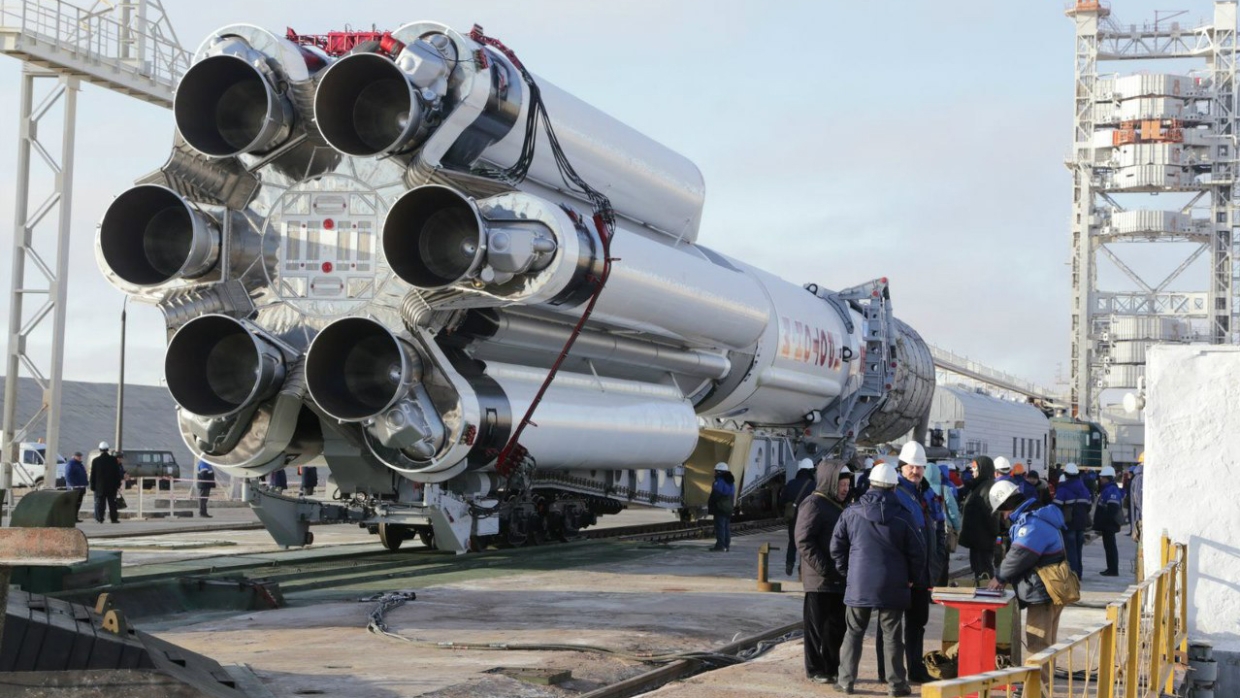Two Caspian region giants, Russia and Kazakhstan, are planning to jointly explore the Final Frontier, or space, through the launch of what is being described as an eco-friendly rocket.
The Baikonur Cosmodrome in southern Kazakhstan is home to the Baiterek Rocket and Space Complex project, which aims to create more eco-friendly carrier rocket launches that use kerosene and oxygen as the fuel source rather than toxic substances.
Kazakhstan’s Minister of Defense and Aerospace Industry Beibut Atamkulov spoke at an international space forum in Astana, held from October 19-20 and dedicated to the 60th anniversary of the launch of the First Artificial Earth Satellite, where he noted the global importance of Baikonur and the Baiterek project.
“Today, Baikonur is probably the property of all mankind,” Atamkulov said, according to KazInform.com. “This is a wonderful, unique complex that has initiated the development of many technologies, and not only in the former Soviet Union, but throughout the world.”
Russia is currently leasing what is the world's first and largest operational space launch facility, until 2050, where it has carried out 470 launch missions since the 1990s. The first artificial satellite, Sputnik 1, and the first human spaceflight, Vostok 1, were launched from Baikonur during the era of the Soviet Union, which had built the facility in the 1950s.
"The key project … is the Baiterek project, to create a new, environmentally friendly space missile complex. This project has already been launched this year, [and] we plan the first launch of the new complex in 2022,” Atamkulov said. “The Kazakh side will work on the ground complex and infrastructure; the Russian side, for missile activities,” he added, referring to Russia’s role in creating a new-generation, middle-class launch vehicle.
Kazakhstan is pursuing the project at a price somewhere between $280 million and $310 million, and is responsible for modernizing existing ground equipment and infrastructure. Russia’s outlay is estimated at around $500 million, and will cover the cost of the space transportation vehicles.
The Baiterek project was conceptualized in 2004, but it had been beset with delays and funding set-backs. Although the project’s completion was reported earlier this year to not be until 2025, remarks by Kazakhstani officials at the anniversary celebration indicate the project will be ready for testing within five years.
“The first test launch from the Baiterek complex is to be carried out by the end of 2022,” said Kazakhstan’s Vice Minister of Defense and Aerospace Industry on the sidelines of last week’s gathering.







 Armenian sappers commenced on Monday mine-clearance operations in the territories adjacent to the Saint Mary Church in village of Voskepar (Armenia...
Armenian sappers commenced on Monday mine-clearance operations in the territories adjacent to the Saint Mary Church in village of Voskepar (Armenia...
 The Mine Action Agency of Azerbaijan (ANAMA) reported on Thursday the discovery of a significant amount of explosives in the Khojavand district of ...
The Mine Action Agency of Azerbaijan (ANAMA) reported on Thursday the discovery of a significant amount of explosives in the Khojavand district of ...
 Iran has refuted reports of alleged damage to Shimon Peres Negev Nuclear Research Centre located southeast of Dimona, Israel, during the recent air...
Iran has refuted reports of alleged damage to Shimon Peres Negev Nuclear Research Centre located southeast of Dimona, Israel, during the recent air...
 Iran’s Foreign Minister, Hossein Amir-Abdollahian, has labeled a foiled Israeli drone attack in certain parts of the country as a "failure" for Isr...
Iran’s Foreign Minister, Hossein Amir-Abdollahian, has labeled a foiled Israeli drone attack in certain parts of the country as a "failure" for Isr...



